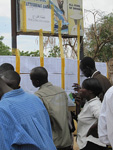
This post was written by Eric Reeves and originally appeared here on sudanreeves.org.
Abundant and timely reporting on the fatally flawed Sudanese elections is, for the regime in Khartoum, an acutely embarrassing development, if génocidaires can feel embarrassment. A range of Sudanese human rights groups, civil society organizations, and independent observers have offered an extraordinary chronicling of gross electoral violations, deliberate fraud, intimidation, and illegal use of state resources. And thanks to the Internet, these reports can be tabulated, collated, and compared with each other and with the findings of international human rights groups, as well as those of the various “think-tank” reports commissioned over the past year to analyze the prospects for Sudanese elections.
Necessarily, the compilation comprises anecdotal evidence (no truly systematic reporting would have been permitted by the regime), and its topics are heterogeneous—speaking now of ballot boxes with fake seals, on other occasions of intimidation of poll monitors by the regime’s security forces, and in the case of Darfur, of voting that in some camps for displaced persons did not reach three percent. The fraudulent methods are, as they have been reported, at times subtle. In other instances they are shamelessly brazen: in one case the military was spotted hoisting ballot boxes over a wall in back of a polling center, no doubt to be filled elsewhere (the military was to have no role in the elections).
It will take some time to organize and check all these reports, but the upshot is as clear now as when I wrote two weeks ago that the National Congress Party (formerly the National Islamic Front) would win overwhelmingly, and may yet win a “super majority” in the National Assembly. One report from Kassala State in the north has al-Bashir running ahead with 97 percent of the vote; even with a boycott by most major parties, this figure is ludicrous, but may be a harbinger of legislative results to come.
All of this leaves international actors in the position of having to comment on the integrity of these elections. Unsurprisingly, the African Union and Arab League have declared the elections a victory for the “process of democratization,” unconcerned by the most blatant of violations. But the more interesting, and consequential, responses are those that will come from the US, the European Union, and the UN. The State Department has tried, awkwardly, to walk back US special envoy Scott Gration’s declaration that the elections would be “as free and fair as possible." But given the scale and conspicuousness of electoral fraud, the US is still figuring out how to speak publicly of this travesty. An April 20 statement by the White House “regrets that Sudan’s National Elections Commission did not do more to prevent and address such problems prior to voting.” But this disingenuously shifts the blame by failing to note that the NEC is entirely a creature of the regime, and has acted throughout the electoral period precisely as instructed. Most consequentially, the White House statement makes no mention of what effect, if any, this assessment will have on US policy toward Khartoum and in responding to Sudan’s many crises. The boilerplate of the moment is that the US “remains committed to working with the international community to support implementation of outstanding elements of the Comprehensive Peace Agreement….”
Click here to continue reading.
Eric Reeves is Professor of English Language and Literature at Smith College. He has spent the past ten years working full-time as a Sudan researcher and analyst, publishing extensively both in the U.S. and internationally.
Photo: Sudan voters crowd around polling lists. (Maggie Fick)

